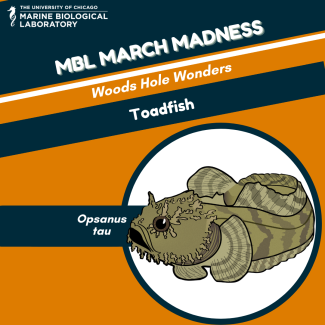MBL March Madness: Toadfish

The oyster toadfish (Opsanus tau) lives in the northwest Atlantic from Massachusetts to as far south as Florida. Its mottled coloring provides camouflage that allows it to lie in wait and ambush prey, which include crabs, shrimp, squid, and small fish. Both sexes can produce short grunts; however, male toadfish emit longer duration “boatwhistles” to acoustically attract females to the nest site. Toadfish produce these sounds by vibrating special sonic muscles next to their swim bladders 200 times per second. Researchers at the MBL are particularly interested in that muscle, which is the fastest ever recorded in a vertebrate. Toadfish are also useful for inner-ear research as their broad, flat heads allow access to the otolith organs, which are used for equilibrium and balance as well as hearing.
Fun Facts:
- Male toadfish will “sing” to find a mate, although their song is mostly a series of grunts. The male call is termed a “boatwhistle.”
- Their jaws are powerful enough to eat oysters and crabs.
- In 1998, two toadfish from Woods Hole went into space with John Glenn to study the effects of microgravity on the vestibular system.
Woods Hole Wonders Division
This division focuses on some amazing organisms found right in Woods Hole. The waters here are teaming with ecological diversity. The Gulf Stream brings animals and plants from southern waters to Woods Hole, while the colder waters of Cape Cod Bay host mainly northern marine forms. For decades, scientists have flocked to Woods Hole to study the organisms in the local waters and saltmarshes.

